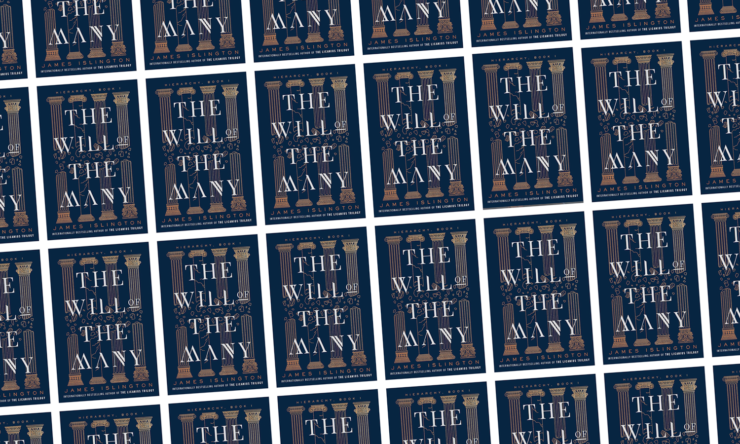The title of James Islington’s new book, The Will of the Many, isn’t just a political metaphor. In the Catenan Republic, those at the bottom of the hierarchy cede their strength and energy—their Will—to those above them, gifting them with power both physical and magical. Eight Octavii give half their Will to a Septimus above them; seven Septimii give half of that pooled Will to a Sextus above them; and so on up the pyramid through Quintus, Quartus, Tertius, Dimidius, and Princeps.
And Vis wants none of it. The former prince of the nation of Suus, conquered by Catenan three years ago, he’s hiding out in the orphanage of a border town, scraping together money from prison work and fighting rings. Even though it’s earned him scorn and a mess of whip scars upon his back, he’s resisted going to the Aurora Columnae, strange relics that allow a person to begin ceding their Will. It’s a precarious, unsustainable life—until Magnus Quintus Ulciscor Telimus comes calling to enroll Vis at the most prestigious academy in Catenan.
Of course, there’s a price. Ulciscor’s brother died under suspicious circumstances at the Academy years ago, the only witness the now-head of the Academy, Veridius. And the island of Solivagus, which houses the Academy, is home to more unearthed ruins, rife with unknown power waiting to be claimed—which the Academy, and its political backers, refuse to let anyone else investigate. Vis, now enrolled at the Academy, is Ulciscor’s perfect opportunity to find the truth. Vis’s princely education means he won’t be completely out of his depth among the children of statesmen and generals—and his status as an orphan hiding his past means he can’t refuse Ulciscor and make an enemy of the high-ranking senator. (Plus, the Academy is the one place in Catenan where Will usage is explicitly banned, to create a level playing field; a respite, for Vis, from the otherwise overwhelming pressure to become part of the system.)
Buy the Book


The Will of the Many
Conflicting motivations and factions (the wills of the many, perhaps?) are the throughline of the book. Vis himself wants to get as far away as possible from Catenan, not to work for its government; Ulciscor needs him to do his spywork; and if that weren’t enough, the Anguis, a vicious group rebelling against Catenan, are pressuring Vis by threatening to reveal his secrets.
And, of course, the Academy is merely a microcosm of the Republic’s political intrigue, with its own hierarchy. In order to fulfill Ulciscor’s demands, and not incur his wrath, Vis will have to advance from the large, lowest-ranked Class Seven to join the single-digit elite ranks of Class Three. He’ll also have to choose, sometimes poorly, where to make allies and where to make enemies, given all the students’ extensive connections. But Vis has a soft spot for the underdog—and anger issues, and an eye for trouble—and so he falls in with the likes of Callidus Ericius, a brilliant but disgraced student confining himself to Class Seven. But Callidus may be the rarest of all things at the Academy: a friend.
Underlying it all are broader questions of the way the world works. What is Will? What is it possible to do, with enough of it—and what are the limits of its power, if any? The ability to manipulate Will precedes the Catenan Republic, precedes the mysterious Cataclysm that wiped out most of the world’s population, and everything Catenan has accomplished thus far is but a shade of what pre-Cataclysm empires could do.
In many ways, the worldbuilding is reminiscent of Robert Jackson Bennett’s Foundryside, even drawing cultural inspiration from the same geographical area (though not the same time period: Bennett’s Tevanne is based on the powerful merchant families of Renaissance Italy, while Catenan is Roman through and through). Both societies are built from the magic of a much older, much more powerful society, playing with its scraps while seeking the ancient, lost, godlike power of their predecessors. And both scriving and Will have the power to imbue inanimate objects with a sort of life, to move or track someone or mimic their similarly-animated counterpart.
But Foundryside’s Sancia is intimately, viscerally enmeshed in the magic of scriving, and she works with researchers and artisans that have dedicated their life to understanding its secrets. Even when the old rules start to break down, Sancia and her crew aren’t far behind in understanding, or at least theorizing, how it works. Vis is far removed from the specifics of Will—he’s never wielded it, and Islington glosses over the more technical aspects of his education, like the discussion in class of “how Casual and sub-Harmonic imbuing can be combined to reduce the amount of Will needed to operate complex machinery.” There are unsettling, gripping scenes where we can see a deeper power at work… but, at least in this first book, we don’t move much closer to understanding it.
That’s the thing. The Will of the Many is, ultimately, the first book in a series, and it feels like it. Islington clearly knows this expansive, intricate, layered world that he’s created, of Catenan and all its histories, and is doling out only a tiny part of it in this book. A dozen plot arcs are kicked off, only becoming thornier as the story progresses, and in the end just a handful are resolved. There’s a lot going on, and when I closed the book at the end I didn’t feel like I’d finished a story, but that I’d barely begun a much larger one. That can be a good thing, for a series—but it also means it’ll be a long wait for the second book.
The Will of the Many is published by Saga Press.
Charles Bonkowsky is the president of Columbia University’s Science Fiction Society and loves talking to people about books.










